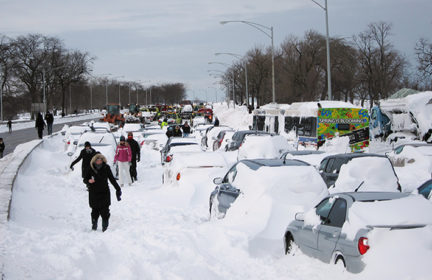Improving your vehicle maintenance
What sort of preventative maintenance do you do on your vehicle to enhance your vehicle’s readiness in case of an emergency?
https://paultmartin.com/blog/f/project-improve-your-vehicle-maintenance
-
Comments (7)
-
Mike Hill - July 29, 2020
Good advice! I’ve tried to think about my car like I do my body. If I had to bug out and carry a big pack, am I fit enough to do it? Same for the ride. If it was go time, is my car going to break down because of something I could have prevented?
-
Bradical - January 10, 2021
I’ve tried to always keep up on repairs that the mechanic recommends (usually doing it myself, because I charge much less for labor) and knowing preventative maintenance like when the transmission fluid needs changed at 100k miles. Doing those a little before they become an issue gives me a sense of satisfaction that I care about the things that I own, gives me a good working vehicle, and saves me money in the long run. Put aside a little each month into a car repair budget. You will be more likely to do the necessary repair when you need to if you have the money, and you won’t rip off the mechanic’s head when he tells you the final price. So much less stressful
Storing some basics like an extra air filter and oil change in my garage helps me to know that I can do some minor repairs and maintenance without having to go out to the store. If there was an oil leak that caused my oil level to be really low, I wouldn’t have to risk driving my car and having it blow up on me, or pay for an expensive tow. I could do the fix there at my house.
Doing maintenance yourself helps you to understand your car, appreciate it more, and know how to fix things in a pinch. And with most repair knowledge today on YouTube, you just have to have the time and tools. If you are still nervous about doing your own repairs, look up Chrisfix on YouTube. He makes even the most daunting repairs look so easy and accessible to everyone.
-
Downunder - January 11, 2021
My cars get the scheduled maintenance, sometimes by my mechanic, sometimes by myself. Both are in perfect working condition (my 4wd only 3 years old). In a shtf event I consider my car to be expendable, all it needs to do is drive the 200 miles to my retreat. Anything more than that is a bonus.
-
Carter Murphy - January 11, 2021
I agree that as long as your car can get you to your bug out location, it has done it’s main job. But then having access to a vehicle while at your bug out location/retreat would be so helpful to haul things like wood, rocks, and gear. But not 100% necessary.
I’ve been wanting to make a solar little cart/carrier thing that is very simple mechanically, and has renewable energy to run forever for little chores around my bug out location.
-
Downunder - January 11, 2021
One of these perhaps:
This was my daughter’s horse (went to the big grass paddock in the sky, aged 30).
-
Carter Murphy - January 11, 2021
That’ll do… haha
Funny how we (at least I am) wired to first think about vehicles and other modern responses to challenges first. Sometimes, actually many times, it is best to look to the past. Those in the past know so much more about prepping than we today will ever know. They lived it every day. We live it during a weekend or two in the mountains in the summer.
Thanks for reminding me of that. RIP cute horsey
-
-
Alicia - January 12, 2021
First and foremost, I fill up every time I run errands and try to never let the tank get below half – 3/4 during this pandemic. This is so fundamental and also so easy to neglect. I do the recommended scheduled maintenance typically at a mechanic or dealer. I request tire rotations with every service and typically replace the wiper blades more often than most because in SoCal, they die in the smog and also don’t get used very often = surprise failure if not checked. I also recommend going to the dealer at least every year or so for recall repairs. The list of recalls was a bit long the last time I was in and I only was notified of one. Not all of them were serious ( a sticker on the inside of the door because an arrow indicating the door lever disable switch was backwards – really?). The other thing I did just this weekend was to check my tire pressure – and get it back to correct levels. Admittedly, this was because the car told me they got low. Having a tire gauge in the glove box has served me many times. Always check the spare! I had to detach it and flip it over to check its pressure. Yep, it was WAY low. And I had to get that spare with jack aftermarket. It’s just a donut version, but my 2017 didn’t come with it even though it had space – saved the manufacturer money and upped the MPG rating. Instead, it had a compressed air inflator which fits in with the spare – redundancy!
Like Bradical, I have some fluids in my garage for emergencies: brake, oil, washer fluid. I can also take these if necessary in a bug out scenario. I also agree that being familiar with or able to do repairs like changing a tire, checking fluids, changing oil, brake liners can help you communicate issues to a mechanic and understand if they’re taking you for a ride if you don’t do them yourself.
-
- How to sew and repair a leather glove - 2 weeks ago
- Moooooooo…Can you rec a powdered milk? - 2 weeks ago
- Light weight backpacking gear and techniques - 2 weeks ago
- News for the Week 12-16-24 - 2 weeks ago
- News for the Week 2024-11-18 - 1 month ago
This forum is heavily moderated to keep things valuable to as many people as possible. Full community policies are here. The basics:
- 1. Be nice to each other.
- 2. Stay focused on prepping.
- 3. Avoid politics, religion, and other arguments.
- 4. No unfounded conspiracies, fake news, etc.
- 5. Debate ideas, not people.

